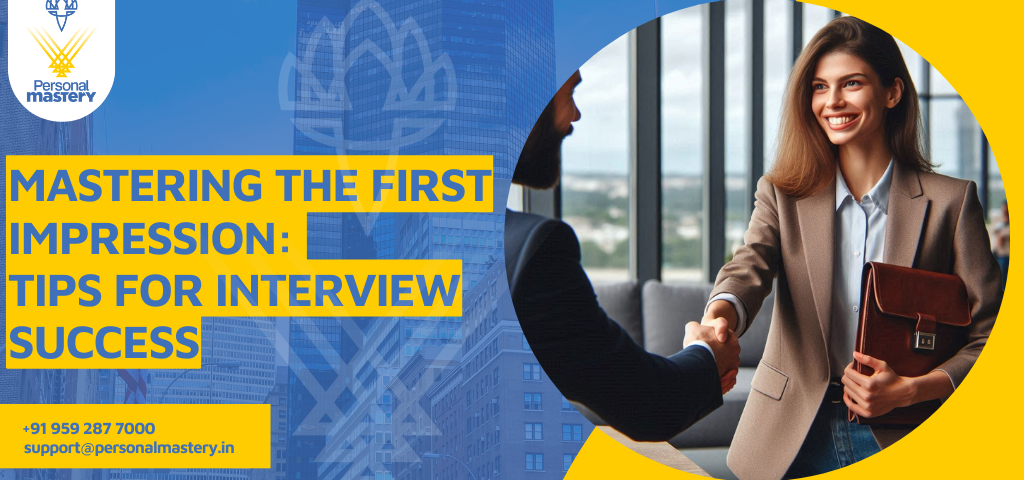
Top Skills to Master for Professional Communication Success
November 12, 2024
Top Benefits of Mindfulness Meditation for Personal Growth
November 21, 2024First impressions determine the atmospheric conditions for an interview to follow successfully. Research has shown that interviewers often establish fixed impressions that dominate their overall ratings within seconds of meeting a candidate. Hence, mastering the skill set of making a strong first impression can significantly heighten one’s chances of interview success. This blog will explore solid techniques for establishing that calling card impression, featuring insights gathered from the Interview Success Coaching Certification Program offered by Personal Mastery.
The Power of First Impressions
First impressions matter very much because they shape how an interviewer sees your competence, confidence, and character. It’s so easy to leave a permanent mark wherein the interviewer remembers you positively because you gave a strong prep on professional communication, body language, and some non-verbal cues.
Essential Tips for a Great First Impression
A few practical tips ensure that you can create a positive influence right from the moment you walk into the interview.
1. Dress Appropriately
Professionalism in the Workplace begins with how you present yourself. Dress codes vary according to the particular industry, but it is better to err on the side of caution and choose professional attire; neat, well-fitted clothes that sit within the mode of dress in the company illustrate respect and attention to detail. For example, if one is interviewing for corporate seats, formal suits/dresses are usually what to go for.
2. Cultivate Confident Body Language
Body language speaks louder than words, especially in an interview on a high-stakes level. Practice a good firm handshake, unbroken eye contact, and standing tall with confident and open body language. For example, students developed body language training to create a powerful yet competent image as part of the Interview Success Coaching Certification Program by Personal Mastery.
3. Master Your Introduction
Good introductions generate high rapport and development opportunities. An introductory statement should be brief, to the point, and enthusiastic. An introduction should cover your name, background, and any relevant highlight of skills or experiences. But your goal is to not to get trapped into having to reel off a list of resume details-this is your moment to briefly give a quick, clinical, but positive snapshot of who you are as a professional.
4. Nonverbal Communication is Key
If you observe, you may find that nonverbal aspects- posture, expressions, hand movements- speak loudly about you. For example, leaning forward a bit while you listen shows that you are engaged or alert while sitting in a class. The Interview Success Coaching Certification Program emphasizes the importance of interpreting nonverbal communication for effective interviewing that makes candidates aware of their own body language.
5. Prepare and Practice
Effective separation is among the main virtues in any interview: Look into the company, gain knowledge of the job description, and prepare how your attributes would accomplish the objectives of the company. Practicing the answers to possible questions may help relieve the jitters and inspire a feeling of confidence and readiness.
6. Handle Nerves with Poise
Interview nerves are common among even the most seasoned interviewees. Yet, conquering nerves will certainly contribute to holding that initial impression. One effective trick is to do regular deep abdominal breathing to calm the mind and keep focus sharp. The Interview Success Coaching Program also covers psychological statements on the dynamics of interviews to help candidates better understand and alleviate their nervousness.
7. Show Genuine Interest in the Company
Interviewers highly appreciate candidates who vividly demonstrate their genuine interest in the company and its mission. Please take a while to share what excites you about working for the company and how you intend to contribute to its success. Discard generic statements and use remarks referring to specific elements of the organization’s culture or current achievements.
8. Ask Thoughtful Questions
Asking thoughtful questions demonstrates that you are truly interested and engaged in this essay. Don’t ask for the basic facts already found in the job description; instead, ask questions that reflect a full understanding of what this role means to your company as a measure of success. For instance, you might want to know, “How does this role affect strategic goals for the team?”
9. End on a Strong Note
Finish with a hand clasp, direct eye contact, and a courteous thank-you. Simply saying, “Thank you for this opportunity; I look forward to potentially contributing to your team” may linger in the minds of interviewers. Just remember that people tend to score the first and last impressions on which they base their remembrances of an encounter.
A Case Study: Arjun’s Interview Transformation
Arjun is newly graduated in engineering from Delhi but made little impression due to repeated slouches, downcast eyes, and speaking incoherently and inaudibly. As a result, he was perceived as lacking in confidence. Realizing his inadequacy Arjun enrolled in Personal Mastery’s Interview Success Coaching Program under the tutelage of an experienced coach and trainer, Prabhleen Gupta.
Role-playing and targeted body language training allowed Arjun to depict confidence in his handshakes, eye contact, and upper posture. Furthermore, he also was able to project his thoughts clearly and profoundly during the interview. Calling back, only somebody like him could shine through with the technical interview hands down and that had been such a journey for him; a true story to portray the importance of an impressive first impression, even for the uninitiated.
Advanced Tips for Leaving a Lasting Impression
Once you’ve covered the basics, really, the place to go is advanced strategies to ensure the interview leaves an impression.
Importance of Continuous Improvement in Interview Skills
Interview skills, like any professional skill, will only develop with practice and performance feedback. The Interview Success Coaching Program at Personal Mastery offers extended support in the form of practice interviews and role play to enhance candidates’ performance and self-confidence. With the proper coaching and commitment, creating a first impression becomes a sustainable skill set.
Why First Impressions Matter More Than Ever
In the present job market, which is extremely competitive, one must combine professionalism, interpersonal skills, and confidence in order to stand out. It is also important to impress an employer by this very first impression as it shows that you possess the poise, professionalism, and competency that he is looking for in a potential employee.
Interview Success Coaching presents candidates with transformative experiences because it provides candidates with tools for success. The program led by Prabhleen Gupta at Personal Mastery is accredited by the IBPCT and is geared toward making candidates both perform better in their interviews and carry those skills forward into their careers.
Enroll Today for an Interview for Success
Mastering the first impression is a critical skill for any kind of movement in one’s career, and a structured coaching program can provide you with the expert advice you have long sought. The Interview Success Coaching Certification Program will develop in you the ability to leave a confident and impacting first impression, initiating new doors of great opportunities for you.
To create a lasting statement upon first sight requires dedication, practice, and self-awareness. Focus on body language, communication, and professional demeanor to enhance your interview impact. Remember, every interview is an opportunity for you to present the best version of yourself—make it count!
Contact Us
Phone: +91-9592877000
Email Id: support@personalmastery.in
Address: #748, Sector 9, Panchkula (Chandigarh), Haryana (INDIA) – 134113
FAQ’s
1) Why is the first impression so important in an interview?
The first impression is crucial because it sets the tone for the entire interview. Studies show that interviewers often form an initial impression within the first few seconds, and this impression can influence their perception throughout the interview. Appearing confident, professional, and well-prepared can positively shape the way the interviewer views your suitability for the role.
2) How can I make a strong first impression with my body language?
Body language plays a key role in creating a positive impression. A firm handshake, steady eye contact, and an upright posture convey confidence and competence. Avoid crossing your arms or fidgeting, as these can suggest nervousness or defensiveness. Practicing your body language before the interview can help you appear more natural and self-assured.
3) What should I avoid saying in my introduction?
In your introduction, avoid focusing too heavily on personal information, irrelevant job details, or appearing overly informal. Instead, briefly highlight your professional background, relevant skills, and enthusiasm for the role. Keeping it short and relevant helps maintain professionalism and keeps the interview on track.
4) How can I handle my nerves to make a better first impression?
Handling nerves starts with preparation and mindfulness. Practice answering common questions, take deep breaths to stay calm, and visualize a positive outcome before the interview. Techniques like deep breathing or focusing on positive thoughts can help you remain composed and project confidence.
5) What are some common mistakes that can hurt a first impression?
Some common mistakes include arriving late, dressing inappropriately, failing to make eye contact, and not listening actively. These behaviors can suggest a lack of professionalism or interest. Being punctual, dressing appropriately, and actively listening show respect and readiness, helping create a positive, lasting impression.


